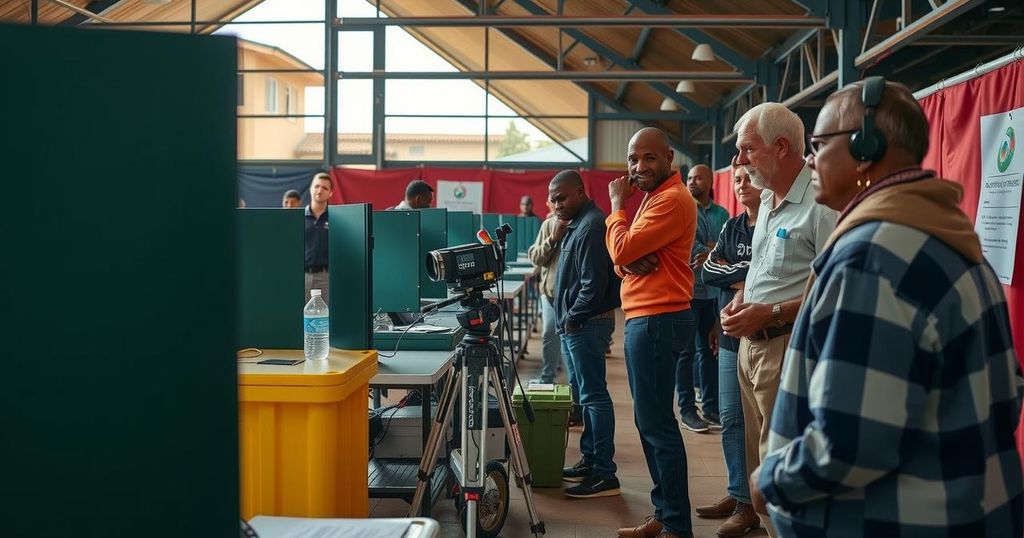Politics
AFRICA, ASSOCIATED PRESS, CENTER, DEMOCRACY, ELECTORAL COMMISSION OF NAMIBIA, ELSIE NGHIKEMBUA, FRELIMO, GOVERNANCE, GOVERNMENT, MOZAMBIQUE, NAMIBIA, NANGOMBE SHITALENI, NET, NETUMBO NANDI - NDAITWAH, NORTH AMERICA, OKANDJENGEDI, OPPOSITION, POLITICS, SWAP, SWAPO, UNITED STATES, WINDHOEK
Jamal Walker
0 Comments
Namibia Extends Election Voting Amid Technical Issues and Opposition Discontent
Namibia’s electoral agency has extended voting for elections due to ballot paper shortages, leading to opposition claims of illegality. Long queues and logistical issues have hindered voter participation. With high unemployment and youthful frustration towards the ruling party, the election reflects broader discontent in southern Africa’s political landscape.
Namibia’s electoral agency has announced an extension of voting for the presidential and parliamentary elections due to technical difficulties and shortages of ballot papers, prompting allegations of fraud from the opposition. Initially scheduled to conclude on Wednesday, polling stations will now remain open until Saturday evening. The opposition party, Independent Patriots for Change, has deemed this extension illegal, igniting concerns over potential manipulation of the electoral process.
As voters experienced significant delays and long queues at polling stations, many reported being unable to cast their votes by Friday afternoon. Elsie Nghikembua, chairperson of the Electoral Commission of Namibia, attributed these challenges to logistical issues. Furthermore, some remote areas remained without ballot paper supplies, leading to growing frustration among voters, particularly in rural regions.
In the context of recent turmoil in Mozambique, also marked by allegations of election rigging, Namibia’s electoral situation raises alarm. Vice President Netumbo Nandi-Ndaitwah of the ruling SWAPO party seeks to become the first female leader of Namibia; however, she faces formidable opposition from a youthful electorate dissatisfied with economic disparities in a nation rich in natural resources yet grappling with high unemployment.
Historically, Namibia’s elections have been viewed as credible, bringing forth a stable democratic environment since independence in 1990. Nevertheless, the prevailing dissatisfaction among young citizens mirrors a broader trend in southern Africa where voters are increasingly seeking change from long-standing political establishments. This discontent plays a crucial role in shaping public sentiment as the nation approaches a pivotal electoral decision.
Namibia, a former German colony and later part of South African rule, gained independence in 1990 with the SWAPO party leading the charge. For 34 years, SWAPO has maintained political dominance, but recent electoral processes have faced scrutiny as young voters express frustration over economic inequality and high unemployment rates. Historically, elections in Namibia have been regarded as stable and credible, but the current challenges reflect a shifting public sentiment and the urgency for responsive governance amidst economic hardship.
In conclusion, Namibia’s decision to prolong voting amid technical setbacks has sparked significant opposition claims of electoral illegitimacy, reflecting broader concerns about democratic integrity. With a substantial portion of voters facing challenges in casting their ballots, the electoral process is under scrutiny as it navigates a landscape marked by economic disparity and the demand for change. As the country approaches a crucial moment in its political landscape, the upcoming election will reveal the electorate’s response to these pressing issues and the forward direction of Namibian democracy.
Original Source: abcnews.go.com




Post Comment